|

tel +44
(0)1424 88 35 70
| |
The
Oriental Caravan's
Postcard from Mount Kailash...
|
July 2002
Dear All,
Tashi Delek!
The Oriental Caravan has recently
returned from its successful expedition across the icy
wastes of the Tibetan plateau to
reach the fabled nexus of the universe, Mount Kailash. There, in the
company of thousands of pilgrims and nomads from all over Tibet, all
aboard The Oriental Caravan were able
to join in the festivities that accompanied this year's great Saga
Dawa festival.
|
|
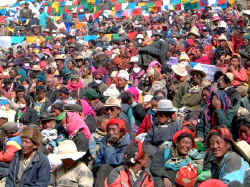
|
|
|
|
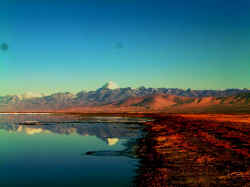
|
| Crowd
at Saga Dawa festival |
|
|
|
Mount
Kailash as seen from Lake Mansarovar |
|
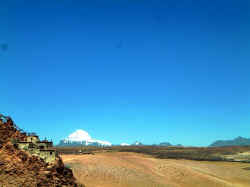
|
|
|
|
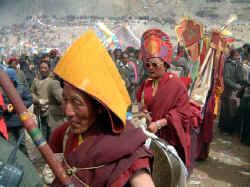 |
|
Chiu Monastery
|
|
|
|
Senior monks on their way to preside over
the Saga Dawa ceremonies.
|
|
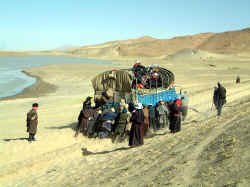
|
|
|
|
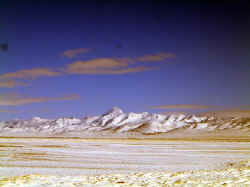 |
|
Pilgrims en route to Kailash help their
transport through the sand |
|
|
|
Kailash in snow
|
|
|
|
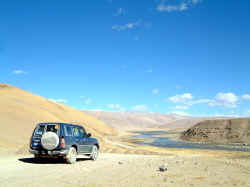
|
|
|
|
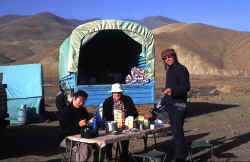 |
|
The
Oriental Caravan en route to
Kailash
|
|
|
|
Breakfast on the Roof of the World
|
|
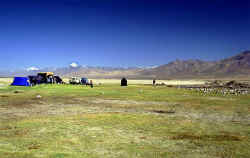
|
|
|
|
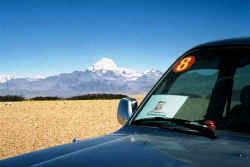 |
High
altitude camp
|
|
|
|
TOC
transport (J. Hipgrave)
|
|
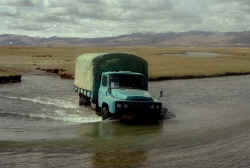
|
|
|
|

|
|
The Oriental Caravan's support vehicle
fords one of the many rivers along the way
|
|
|
|
Filling up in one of only two filling
stations for a thousand kilometres
|
|
|
Located in the
wild far west of Tibet, strikingly beautiful Mt. Kailash is sacred to
four great Asian religions (Tibetan Buddhism, Hinduism, Jainism and
Bon) and is considered by all to be the axis Mundi, the
mountain at the centre of the universe (the reality behind the myth
of Mt. Meru). Flowing from its feet, in the four directions of the
compass, are four of the greatest rivers in Asia - the Indus
(north), the Bhramaputra (east), the Sutlej (west) and the Karnali,
which flows into the Ganges (south). For the Hindus it is the
home of Shiva, the creator and destroyer; for the Tibetans this is
where the great nettle-eating poet Milarepa travelled to the
mountain's summit on a sunbeam (the only person ever to stand on its
top!) thereby triumphing over Tibet's original animist religion,
Bon. |
|
| It took five hard days of driving, much of it at over
4500m, to reach the mountain. Freezing nights under canvas and
extremely poor roads (where there were roads!) meant the journey was
not always easy but the rewards at the end far outweighed any
discomfort. Before approaching the mountain we rested at the magical
Lake Mansarovar, the lake 'formed in the mind of Brahma'. For Hindus
this lake is the ultimate pilgrimage goal and to bathe in its waters,
it is said, is to wash away the sins of a lifetime. |
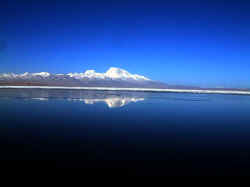 |
|
|
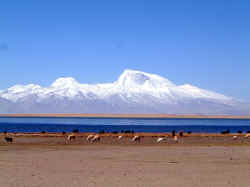
|
|
Lake Mansarovar (tib. Mopam Tso)
|
|
|
Mt Gurla Mandhata (7728m)
|
|
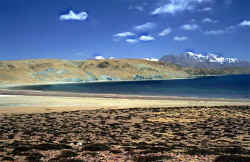
|
|
|
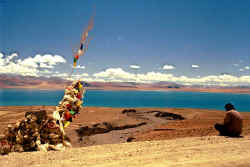 |
|
The western shore of Lake Mansarovar
|
|
|
Lake Pelkhu |
|
|
|
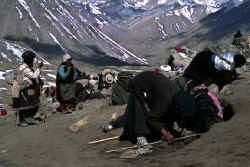
|
|
|
|
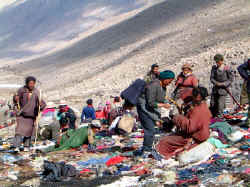
|
|
Pilgrims dig for
sacred medicines on the approach to Drolma La pass (5700m)
|
|
|
|
As a symbol of
leaving their old lives behind pilgrims discard old items of
clothing, or even body parts, before crossing the Drolma Pass,
thereby
|
|
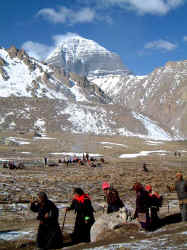
|
|
|
|
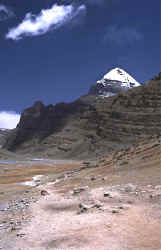
|
|
Pilgrims during
the early stages of the circumambulation pass one of Kailash's
distinct four faces
|
|
|
|
Two hours out
from Darchen, the start point of the kora, pilgrims come across the
first of many massive walls that seem to protect the mountain |
|
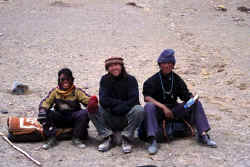
|
|
|
|
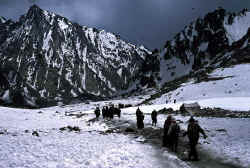
|
|
The
Oriental Caravan's Chief Caravaneer, having completed the
3-day circumambulation, sits sinlessly with friends who helped him
along his way
|
|
|
|
Conditions
underfoot were sometimes icy. During our six day stay at the
mountain there were six fatalities, mainly due to the altitude
|
|
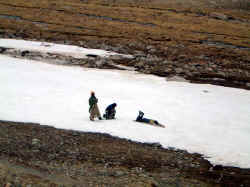
|
|
|
|
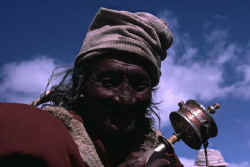
|
|
These men were
prostrating around the mountain on ice. The 16-day prostration
around the mountain ensures escape from samsara for those who
undertake it
|
|
|
|
An old man spins
his prayer wheel as he makes his way around Kailash
|
|
The circumambulation, or kora, of Mt. Kailash is
around 58km and takes one long day for Tibetans (or sixteen if
prostrating) - and three days for everybody else! The hardest part of the
trek is the ascent of the Drolma La pass (5700m), the crossing of which is
said to symbolise the starting of a new life. In the Year of the Horse
(this year, 2002) the spiritual benefits accrued from making the kora
are multiplied by thirteen - and, mercifully, just like bathing in Lake
Mansarovar the sins of a lifetime are washed away! |
| The date of the Saga Dawa festival varies according to
the Tibetan lunar calendar - this year it fell on May 26th. As this,
according to the Eastern 12 year zodiac, was the Year of the Horse,
the year in which Buddha himself was born, the festival was of
particularly great importance. For this reason, and despite its
remote location, it attracted pilgrims from all over Tibet. Many of
them, piled into the back of rickety trucks, bounced their way for
several weeks over thousands of bumpy, dusty kilometres just
to get there. The main event of the ceremony is actually over very
quickly and simply involves the replacement and raising of the prayer
flag-strewn Saga Dawa flagpole. As the pole is raised those in
the crowd throw thousands of paper prayers into the air, followed by
handfuls of barley flour. Up to 20,000 attended this year's festival
to see among other things some spectacular displays of
horsemanship. |
|
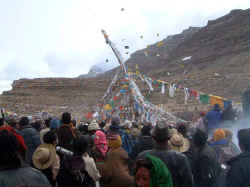
|
|
|
|
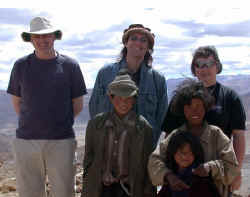
|
|
Lungta 'wind horse' prayers are
thrown into the air at the time of the raising of the prayer
flagpole
|
|
|
|
Oriental Caravaneers
|
|
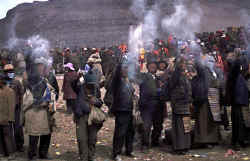
|
|
|
|
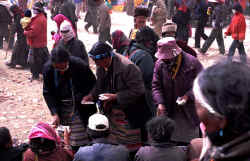
|
'Dra Lha Sol' - the tradition
of throwing tsampa (barley flour) as an offering |
|
|
|
Almsgiving earns religious
merit for the donor |
|
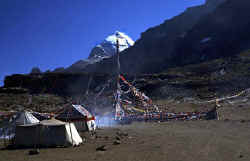
|
|
|
|
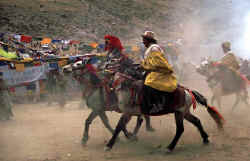
|
|
'Tarboche' the great Saga Dawa prayer
flagpole symbolises Mt. Kailash's position at the nexus of the
universe
|
|
|
|
Horse riders
|
|
|
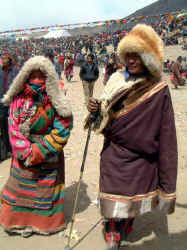 |
|
|
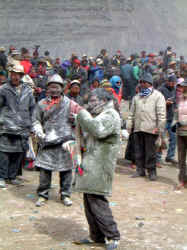 |
Couple, possibly from the
Golok region of east Tibet |
|
|
Enthusiastic flour throwers
|
|
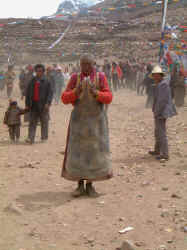
|
|
|
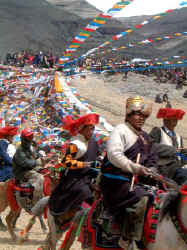
|
This pilgrim with protective
wooden 'clogs' on his hands prostrates around the Saga
Dawa flagpole |
|
|
After the ceremonies horsemen show off their
skills around the Saga Dawa pole
|
|
The
expedition to Kailash was The
Oriental Caravan's most challenging trip so far and, for
all those involved, a quite unforgettable experience. That the
journey was such a success goes in large part to the hard work
and experience of those Tibetan staff who helped us along our way
and heartfelt thanks goes out to them from all members of the
expedition. 'Tu che
chay!' ('Thanks!' in Tibetan) |
|
| That's all for now. There are plans for further
expeditions to Mount Kailash in 2003 and 2004. If you're interested
in coming along please click
here to apply for more information. The
Oriental Caravan's next journey is again to Tibet on 'the
Himalayan Caravan' in September.
Wishing you a great summer,
Happy travels!
From Phil and all aboard The Oriental
Caravan
CLICK
HERE to see more photos from Mount Kailash
|
|
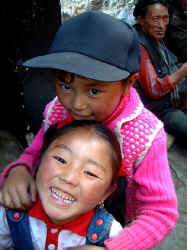
|
|
|
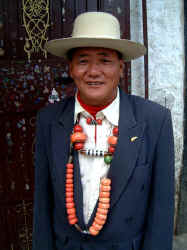
|
|
Girls on the Barkor in Lhasa
|
|
|
Red coral salesman at 'Khampa corner' in
Lhasa
|
|
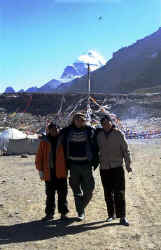
|
|
|
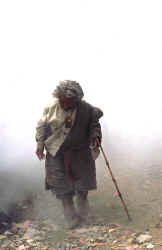
|
|
With
Kailash in the background Chief Caravaneer Phil Colley poses
with Penba and Choedak, some of the veteran members of The Oriental Caravan's
team in Tibet
|
|
|
Elderly pilgrim
|
|
|
|
|
|
| If you would like to comment on this postcard, you
can enter your remarks in the space below (up to 255 characters). |
If you would like a friend or colleague to receive
future mailings from The Oriental Caravan
please enter their email address in the box below and click 'submit'...
|
return
to main photo/ epostcard index
more
photos from mount kailash(recommended!)
click
here to send a reply
back to top
Please forward this 'epostcard' to a friend or colleague.

|






































